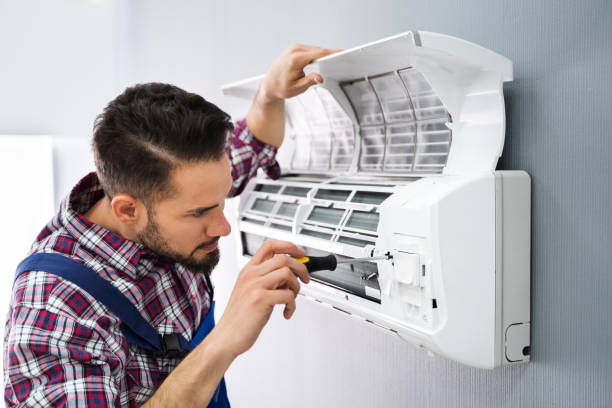However, there are some key advantages to consider when making your decision. In this article, we’ll explore all the benefits of having your HVAC unit replaced and how this process can improve your home’s comfort and energy efficiency.
Considerations Before Replacing Your HVAC Unit
Cost
The cost of replacement needs to be taken into account. It is important to factor in the cost of materials, installation and potential repairs due to malfunctions.
Age
The age of the current HVAC unit should be evaluated. If it has served its purpose for a long time and is already nearing its end of life, it may be wise to invest in a newer model.
Efficiency
A new HVAC system will likely have improved energy efficiency compared to older models. This can lead to considerable cost savings in electricity bills over time.
Maintenance
It is important to pay attention to maintenance costs as well when deciding on whether or not to replace an HVAC system. Newer units may require less maintenance than older systems, saving on labor costs.
The Benefits of Replacing Your HVAC Unit
- Increased Efficiency: A new HVAC unit can be up to 30% more efficient than an older model, reducing energy costs significantly.
- Better Indoor Air Quality: Newer models have high-efficiency air filters that reduce allergens and other airborne pollutants.
- Lower Repair Costs: As your HVAC unit ages, it may require more frequent repairs, which can get expensive over time. Investing in a new unit could save you money in the long run.
- Improved Comfort: An up-to-date HVAC unit may come with adjustable settings or even built-in smart technologies that make it easier to control indoor air temperature and humidity levels for optimal comfort.
- Enhanced Home Value: A newer, better-functioning HVAC system is attractive to potential buyers if you decide to sell your home in the future, potentially increasing its value on the market.
- Quieter Operation: New HVAC units are designed to run more quietly than their older counterparts, which can create a peaceful atmosphere in your home.
- Improved Safety: An up-to-date HVAC system is equipped with modern safety features that can help protect your family from potential environmental hazards such as carbon monoxide poisoning.
- Better Warranties: Many newer models come with better warranties that cover any potential issues for longer.
Top Questions Asked
What can you expect when you have your HVAC unit replaced?
When replacing your HVAC unit, you can expect your installer to remove the old unit and install the new one. This typically includes disconnecting and reconnecting all necessary wires, pipes, and ductwork. After installation, they should also test the system to ensure everything works properly.
How long will it typically take to have your HVAC unit replaced?
The amount of time it takes to replace an HVAC unit varies depending on factors such as the size and complexity of the unit being replaced. Generally speaking, most replacements take between two to four hours.
Does your installer have to replace your ductwork when they replace your HVAC unit?
It depends on the situation – if your existing ductwork is in good condition and not leaking or otherwise damaged, it may not need to be replaced during an HVAC replacement. However, if ductwork needs repairs or has excessive wear/tear, replacing it during an HVAC replacement might be a good idea.
Does your installer have to replace your thermostat when they replace your HVAC unit?
No – unless specifically requested by you or recommended by your installer due to age/functionality issues with your existing thermostat, they are not required to replace it when replacing an HVAC unit.
What should you ask your installer before having your HVAC unit replaced?
It’s important to ask your installer questions before having your HVAC unit replaced. This can include questions about the installed unit type and any additional parts or labor that may be required during the installation. It would help if you also inquired about their experience with similar types of installations and any warranties associated with the job.
What kind of maintenance is required after an HVAC unit is replaced?
Once your HVAC unit is replaced, it’s important to have regular maintenance done to ensure it continues operating efficiently and safely. This typically includes changing air filters, periodic inspections/tune-ups, and other necessary checks/adjustments. Certain maintenance tasks may need to be completed more often than others depending on the type of unit installed.
What should you do if your HVAC is not working properly?
If you notice that your HVAC isn’t working properly or having problems with heating or cooling, the first step should be to check your thermostat settings and ensure everything is in order. If temperature settings are correct and the problem persists, then it’s best to contact a professional HVAC technician to assess and troubleshoot the issue.
What other items need to be replaced when your installer replaces your HVAC unit?
Items such as air filters, air handler covers, gaskets, and other components may need to be replaced during an HVAC replacement. Depending on the age of the existing unit, these can wear out or be damaged and require replacing to ensure the proper functioning of your new system.
Conclusion
Replacing an HVAC unit can be an involved process, so asking the right questions and understanding what to expect is important. Properly installed units should last over 10 years or more, but regular maintenance is essential for keeping them running properly and efficiently. Additionally, working with a qualified technician who can answer questions and provide the necessary expertise for a successful installation is important.

